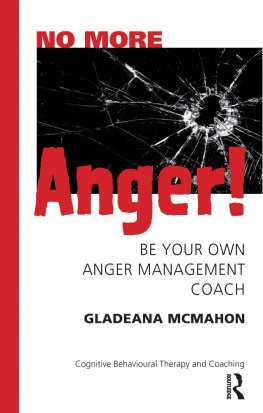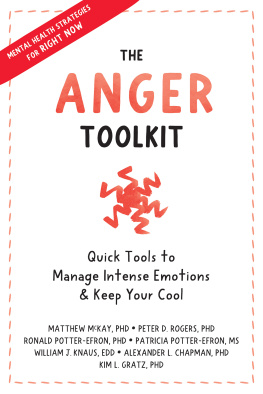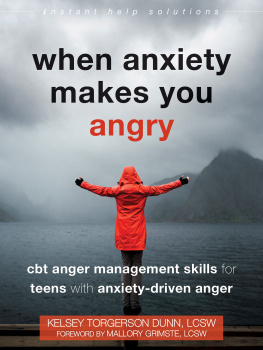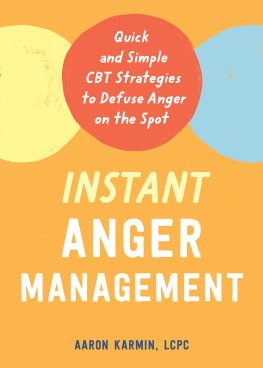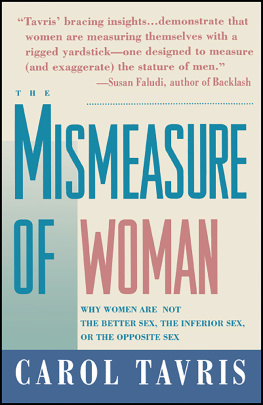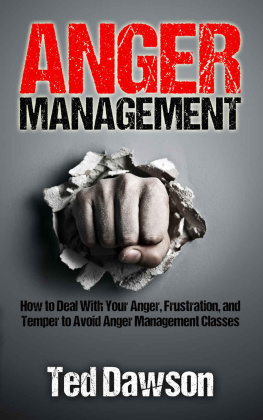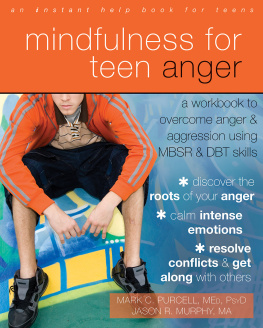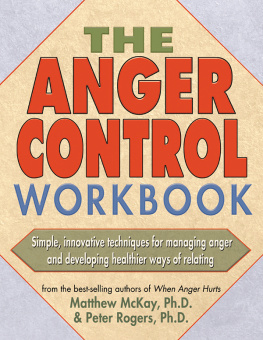No More Anger!
No More Anger!
Be Your Own Anger Management Coach
Gladeana McMahon
Cognitive Behavioural Therapy
First published 2008 by Karnac Books Ltd.
Published 2018 by Routledge
2 Park Square, Milton Park, Abingdon, Oxon OX14 4RN
711 Third Avenue, New York, NY 10017, USA
Routledge is an imprint of the Taylor & Francis Group, an informa business
Copyright 2008 Gladeana McMahon.
The right of Gladeana McMahon to be identified as the author of this work has been asserted in accordance with 77 and 78 of the Copyright Design and Patents Act 1988.
All rights reserved. No part of this book may be reprinted or reproduced or utilised in any form or by any electronic, mechanical, or other means, now known or hereafter invented, including photocopying and recording, or in any information storage or retrieval system, without permission in writing from the publishers.
Notice:
Product or corporate names may be trademarks or registered trademarks, and are used only for identification and explanation without intent to infringe.
British Library Cataloguing in Publication Data
A C.I.P. for this book is available from the British Library
ISBN: 9781855754300 (pbk)
Edited, designed, and produced by The Studio Publishing Services Ltd, www.publishingservicesuk.co.uk
e-mail: studio@publishingservicesuk.co.uk
Publisher's Note
The publisher has gone to great lengths to ensure the quality of this book but points out that some imperfections from the original may be apparent.
Contents
Guide
To all the clients who have allowed me to help them, and to Mike, without whose support I would never have managed to achieve all that I have
The Independent on Sunday and Sunday Observer listed life doctor Gladeana McMahon as one of the UKs top ten coaches. She combines academic rigour with down-to-earth communication skills, and has provided therapy and coaching to politicians, celebrities, senior business people, and those in the media.
A Fellow and Vice President of the Association for Coaching, she holds Fellowships with the British Association for Counselling and Psychotherapy (BACP), the Royal Society of Arts (RSA), and the Institute of Management Studies (IMS). She is a BACP Senior Registered Practitioner, Accredited Counsellor and Supervisor, and a BABCP Accredited CognitiveBehavioural Psychotherapist who is UKCP and UKRC registered. She is also a Certified NLP Coach and NLP Master Practitioner.
Gladeana is Head of Coaching for Fairplace, Co-Director of the Centre for Stress Management and Centre for Coaching, and is an Honorary Visiting Lecturer in the Psychology Department of the University of East London, where she taught on the Diploma and Masters programmes for many years.
An internationally published author, she has written, edited, or contributed to over twenty books on a range of subjects. Her media work includes having presented shows such as Ease the Load , Dial a Mum , and Sex and Soaps . She has also been the Confidence Coach for BBC1s Get Smarter in a Week , and Counsellor for their 20-part series Lifes Too Short . She is currently the Anger Management Coach for Channel 5s Trisha Goddard Show , and Life Coach and Stress Coach for the GMTV and Channel Four websites.
The problem with using words like counselling or psychotherapy is that these words suggest there is only one method of therapy. However, at the last count there were some 450 different therapeutic approaches, some sharing ideas in common and others being as different as chalk and cheese.
CognitiveBehaviour Therapy is a relatively new therapy. Behaviour Therapy came first in the mid-1950s, aimed originally at helping people deal with the symptoms of depression by changing the things that they did. Although Behaviour Therapy was a movement forward as it provided many people with real benefits, it also became apparent that something was lacking, and this turned out to be the attention to the persons individual thoughts that accompanied his or her behaviour.
In the late 1960s, Cognitive Therapy came into being and this therapy focused on the types of thinking styles that caused people distress. It was not long before the benefits of Behaviour and Cognitive Therapy came together, forming what is now called Cognitive Behaviour Therapy often referred to as CBT. Cognitive Behaviour Therapy is the only therapy that has sought assessment and validation through research, its practitioners believing it important that a therapy should not only work but should demonstrate how it works and why. As with all therapies, it has developed from its origins as a way of helping people with depression to a therapy that can help individuals with a number of mental health conditions. There are now many studies supporting the view that the best treatment for a range of conditions is CBT, and, indeed, the National Institute for Health and Clinical Excellence (NICE) and the National Health Service (NHS) have both recommended CBT as the treatment of choice when working with conditions such as depression, anxiety, and anger.
In one study undertaken by Richard Beck and Ephrem Fernandez on the effectiveness of CBT in relation to anger, it was found that the average CBT recipient was better off than 76% of untreated subjects in terms of anger reduction. In a number of additional studies, CBT was shown to have a marked effect in reducing anger and its consequent problems.
In 2002, Professors Windy Dryden and Stephen Palmer, together with Michael Neenan (Co-director of the coaching programme at the Centre for Coaching) and myself, went on to consider ways in which Cognitive Behaviour Therapy could be adapted into a coaching approach that we named Cognitive Behavioural Coaching (CBC). By adapting many of the strategies associated with CBT, we were able to put together a model that helped individuals get the best from everyday life. In addition, by integrating aspects from the new field of Positive Psychology, which aims to increase an individuals basic appreciation of life and general happiness, we were able to produce a model that worked for everyone and not just those with an identifiable mental health problem.
This book takes the skills and techniques of Cognitive Behavioural Therapy and Cognitive Behavioural Coaching and offers you the opportunity of taking control of your anger. The book aims to help you understand what is happening to you and teach you how you can overcome your anger. If you use the skills outlined in this book you will learn how to become your own anger management coach.
Some of you may find it helpful to read the book through once before returning to do the exercises. Others may find it more helpful to tackle each of the exercises as they come up. It is up to you to decide which method suits you best. What is important is that you work through the book at your own pace and in your own way, making sure that whatever way you choose ensures that you understand each and every chapter and exercise. Change will only come about if you practise the skills in your everyday life. Dont expect your behaviour to change overnight, because it took you time to be the person you are and it will take time to change yourself. Be realistic and praise yourself for every change, however small you think it is. Remember that you are doing something positive to coach yourself, and even if you think you may never manage to change, you have taken the first step in doing so.

